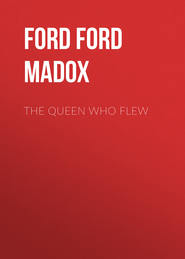По всем вопросам обращайтесь на: info@litportal.ru
(©) 2003-2024.
✖
Privy Seal: His Last Venture
Настройки чтения
Размер шрифта
Высота строк
Поля
They stood one on each side and bent down, extending skinny arms to lift him. Thomas Culpepper sat up and spat in their faces – they fled like scared wolves, noiselessly, gazing behind them in trepidation.
'Stay them; thieves ho! Stay them!' Culpepper panted. He scrambled to his feet, and stood reeling, his face like death, when he tried to make after them.
'God!' he said. 'Give me to drink.'
The young Poins mused under his breath because the man had neither sword nor dagger. Therefore it would be impossible to have sword play with him. He had, the young man, no ferocity – but he was set there to stay Thomas Culpepper's going on to England; he was to stay him by word or by deed. Deeds came so much easier than words.
'Squahre Tom!' the Lincolnshire man grunted. 'Reckon you have no money. Without groats and more ye shall get nowt to drink in Calais town, save water. Water you may have in plenty.'
With a sigh the young Poins unbuckled his belt to get his papers.
'Money I have for you,' he said. 'A main of money.' He was engaged now to pass words with this man – and he sighed again.
But Thomas Culpepper disregarded his words and his sigh. He was more in the mood to talk Lincolnshire than Kent, for his fever had given him a touch of homesickness and the young Poins to him was a very foreigner. He shut his eyes to let the Lincolnshire gatewarden's words go down to his brain; then with sudden violence he spat out:
'Give me water! What do ah ask but water! Pig! brood of a sow! gi'e me water and choke!'
Nicholas Hogben fetched a leather bottle as long as his leg, dusty and dinted, but nevertheless bedight with the arms of England, from the stone recess where the guard sheltered at nights. He fitted it on to the crook of his pike by the handle, and, craning over the drawbridge, first smoothed away the leaf-green duck-weed on the moat and then sank the bottle in the black water.
'I have money: a main of money for ye,' the young Poins said to Thomas Culpepper; but the man, with his red beard and white face, swayed on his legs and had ears only for the gurgling and gulping of the water as it entered the bottle neck. The black jack swayed and jumped below the bridge like a glistening water-beast.
He had little green spangles of duck-weed in his orange beard when he took the bottle away, empty, from his mouth. He drew deep gasps of breath, and suddenly sat down upon a squared block of stone that the masons above were waiting to hoist into place over the archway.
'Good water!' he grunted to Hogben – grunting as all the Lincolnshire men did, in those days, like a two-year hog.
'Bean't but that good in all Calais town!' Hogben grunted back to him. 'Curses on the two wurmen that sent me here.' And indeed, to Lincolnshire men the water tasted good, since it reminded them of their dyke water, tasting of marshweed and smelling of eggs.
'Tü wurmen!' Culpepper said lazily. 'Hast thou been jigging with tü puticotties to wunst? One is enow to undo seven men. Who be 'hee?'
The young Poins, with a sulky sense of his importance, uttered:
'I have money for thee – a main of money!'
Culpepper looked at him with sleepy blue eyes.
'Thrice y' ha' told me that,' he said. 'And money is a goodly thing in its place – but not to a man with a bellyful of water. Y' shall feel my fist when I be rested. Meanwhile wait and, being a cub, hear how men talk.' He slapped his chest and repeated to Hogben: 'Who be 'ee?'
Hogben, delighted to be asked at last a question, shewed his formidable teeth and beneath his familiar contortion of the eyelids brought out the words that one of the women who had brought him down was her that had brought Squahre Culpepper to sit on a squared stone before Calais gate.
'Why, I am a made man, for all you see me sit here,' Culpepper answered indolently. 'I ha' done a piece of work for which I am to be seised of seven farms in Kent land. See yo' – they send me messengers with money to Calais gate.' He pointed his thumb at the young Poins.
The boy, to prove that he was no common messenger, drew his right leg up and said:
'Nay, goodman Squire; an ye had slain the Cardinal the farms should have been yours. As it lies, ye are no more than lieutenant of Calais stone barges.'
'Thou liest,' Culpepper answered negligently, not turning his gaze from the gatewarden to whom he addressed a friendly question of, Who was the woman that had brought the two of them down.
'Now, Squahre!' the Lincolnshire man grinned delightedly; 'thu hast askëd me tü questions. Answer me one: Did thee lie upon her when thee put her name up in the township of Stamford?'
'Stamford in Lincolnshire was thy townplace?' Culpepper asked. 'But who was thy woman? I ha' had so many women and lied about so many more that I never had!'
The Lincolnshire man threw his leather cap to the keystone of the archway, caught it again and set it upon his thatch of hair, having the solemnity of one who performs his rituals.
'Goodly squahre that thee art!' he said; 'thou has harmed a many wenches in truth and in lies.'
Culpepper spied a down feather on his knee.
'Curse the mattress that I lay upon this night,' he said amiably.
He set his head back and blew the feather high into the air so that it floated out towards the tranquil and sunny pasture fields of France.
'Cub!' he said to Hal Poins, 'take this as a lesson of the death that lies about the pilgrim's path. For why am I not a pilgrim? I was sent to rid Paris of a Cardinal Pole, who, being in league with the devil, hath a magic tongue. Mark this story well, cub, who art sent me with money and gifts from the King in his glory to me that sit upon a stone. Now mark – ' He extended his white hand. 'This hand, o' yestereen, had a ring with a great green stone. Now no ring is here. It was given me by my seventeenth leman, who had two eyes that looked not together. No twelve robbers had taken it from me by force, since I had made a pact with the devil that these wall eyes should never look across my face whilst that ring was there. Now, God knows, I may find her in Calais. So mark well – ' He had been sent to Paris to rid France of the Cardinal Pole; for the Cardinal Pole, being a succubus of the fiend, had a magical tongue and had been inducing the French King to levy arms, in the name of that arch-devil, the Bishop of Rome, against their goodly King Henry, upon whom God shed His peace. Culpepper raised his bonnet at the Deity's name, stuck it far back on his red head, and continued: Therefore the mouth of Cardinal Pole was to be stayed in Paris town.
Culpepper smote his breast ferociously and with a black pride.
'And I have stayed it!' he peacocked. 'I and no other. I – T. Culpepper – a made man!'
'Not so,' Poins answered stubbornly. 'Thou wast sent to Paris to slay, and thou hast not slain!'
'Thou liest!' Culpepper asseverated. 'I was sent to purge Paris town, and I ha' purged un. No pothicary had done it better nor Hercules that was a stall groom and cleaned stables in antick days.' For, at the first breath of news that Culpepper was in the town, at the first rumour that the king's assassin was in Paris, Cardinal Pole had gathered his purple skirts about his knees; at the second sound he had cast them off altogether and, arrayed as a woman or a barber's leech, had fled hot foot to Brescia and thence to Rome.
'That was a nothing!' Culpepper asseverated. 'Though I ha' heard said that Hercules was made a god for cleaning stables that he found no easy task. But I will grant that it was no task for me to cleanse a whole town. For I needed no besoms, nor even no dagger, but the mere shadow of my beard upon the cobbly stones of Paris sufficed. I say nothing of that which befel in the day's journey; but mark this! mark what follows!' He had set out from Paris upon a high horse, with a high heart; he had frighted off all robbers and all sturdy rogues upon the road; he had slept at good inns as became a made man, and had bought himself a goodly pair of embroidered gloves which he could well pay for out of his superfluity. Being in haste to reach England, where he had that that called for him, he had ridden through the town of Ardres at nightfall, being minded to ride his horse dead, reach Calais gates in the hour, and beat down the gate if the warder would not suffer him to enter, it being dark. But outside the town of Ardres upon a make of no man's ground, being neither French nor English, he had espied a hut, and in the dark hut a lighted window hole that sparkled bravely, and, within, a big, fair woman drinking wine between candles with the light in her hair and a white tablecloth. And, feeling goodly, and Calais gate being shut, whether he broke it down one hour or three hours later was all one to him. He had gone into the hut to take by force or for payment a glass of wine from the black jacks, a kiss from the woman's mouth, and what else of ease the place afforded.
'Now I will have you mark, cub,' he said – 'cub that shall have to learn many wiles if thy throat be not cut by me within the next two hours. Mark this, cub: these were no Egyptians!' They were not Bohemians, not swearers, not subtle cozeners, not even black a-vised, or he would have been on his guard against them; but they were plain, fair folks of Normandy. So he had drunk his wine, and cast a main or two at dice with the woman and two men, losing no more and no less than was decent. And he had drunk more wine and had taken his kisses – since it was all one whether he came three hours or four hours later to Calais gate. And there had been candles on the table and stuffs upon the wall, and a crock on the fire for mulling the wine, and a sheet upon the feather bed. But when he awoke in the morning he had lain upon the hard earth, between the bare walls. And all that was his was gone that was worth the taking.
'Now mark, cub,' he said. 'It was a simple thing this flitting with the hangings and the clothes and the pot rolled in bales and hung upon my horse. Upon my horse! But what is not simple is that simple folk of Normandy should have learned the arts of subtlety and drugging of wines. Mark that!' He pointed a finger at Poins.
'Had God been good to you you might have been as good a warring boy as Thomas Culpepper, who with the shadow of his hand held back the galleons of France and France's knights from the goodly realm of England. For this I have done by frighting from Paris, Cardinal Pole that was moving the French King to war on us. Had God been good to you you might have been as brave. But marvel and consider and humble you in the dust to think that a man with my brain pan and all it holds could have been so cozened. For sure, a dolt like you would have been stripped more clean till you had neither nails to your toes nor hair to your eyebrows.'
Hal Poins snarled that Culpepper would have been shaved too but that red hair stunk in the nostrils even of cozeners and thieves.
Culpepper wagged his head from side to side.
'This is a main soft stone,' he said; 'I am main weary. When the stone grows hard, which is a sign that I shall no longer be minded to rest, I will break thy back with a cudgel.'
Poins stamped his foot with rage and tears filled his eyes.
'An thou had a sword!' he said. 'An only thou had a sword!'
'A year-old carrot to baste thee with!' Culpepper answered. 'Swords are for men!' He turned to Hogben, who was sitting on the ground furbishing his pikehead. 'Heard you the like of my tale?' he asked lazily.
'Oh aye!' the Lincolnshire man answered. 'The simple folk of Normandy are simple only because they have no suitors. But they ha' learned that marlock from the sailors of Rye town. For in Rye town, which is the sinkhole of Sussex, you will meet every morning ten travellers travelling to France in the livery of Father Adam. Normans can learn,' he added sententiously, 'as the beasts of the field can learn from a man. My father had a ewe lamb that danced a pavane to my pipe on the farm of Sallowford that you sold to buy a woman the third part of a gown.'
'Why! Art Nick Hogben?' Culpepper said.
'Hast that question answered,' Hogben said. 'Now answer me one. Liedst thou when saidst what thou saidst of that wurman?'
Culpepper on the stone swung his legs vaingloriously:












